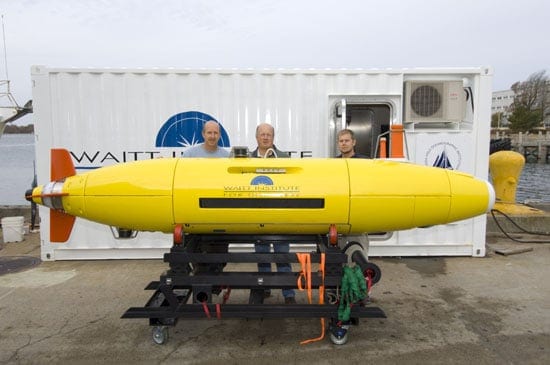Partnership Provides Autonomous Vehicles to Enable New Era of Deep Sea Research
December 3, 2008
The Woods Hole Oceanographic Institution (WHOI) has partnered with the Waitt Institute for Discovery to make deep-sea exploration technology and a world-class operations group broadly available for the oceanographic community. The collaboration, called the CATALYST Program, features the Waitt Institute’s two newly-built Hydroid REMUS 6000 Autonomous Underwater Vehicles (AUVs), which can explore depths of up to 6,000 meters, or 3.7 miles, below the ocean’s surface. The vehicles are capable of conducting hydrographic surveys, environmental monitoring, debris and field mapping, search and salvage operations, fishery operations, scientific sampling and seafloor mapping.
WHOI developed and engineered the REMUS AUVs and has assembled a rapid-response operations team with the expertise to conduct REMUS 6000 expeditions anywhere in the world. The Waitt Institute for Discovery commissioned the construction of two REMUS 6000 AUVs and directs the implementation of CATALYST expeditions.
“AUVs are quickly proving to be the most accurate, efficient, and cost-effective technologies available for exploring the oceans,” said Ted Waitt, founder and president of the Waitt Institute for Discovery and founder and former chairman of Gateway, Inc. “We have a shared objective with WHOI: to accelerate and advance deep-sea exploration, cutting-edge scientific research and sustainable ocean policy. We believe the CATALYST Program will make deep-water technology available to the broader oceanographic community to enable important discoveries and spawn new areas of research.”
Versatile research tools, the REMUS 6000s can be configured with different sensor packages tailored to specific missions. The vehicles are equipped with side-scan sonar, which can cover broad swaths of the seafloor — up to 750 meters on either side of the vehicle — and high resolution cameras for detailed up-close imaging. Sensors can also be added that detect ocean chemistry, such as carbon, oxygen and nitrogen content. The vehicles can be used for hydrographic surveys, environmental monitoring, debris and field mapping, search and salvage operations, fishery operations, scientific sampling, and seafloor mapping.
The inaugural CATALYST expedition — CATALYST ONE — partners with the Harbor Branch Oceanographic Institution and launches on Dec. 4, 2008. Researchers aboard the R/V Seward Johnson will utilize the program’s AUVs to create the first-ever high definition side-scan sonar maps of deep-water Lophelia and Oculina coral reefs off the coast of eastern Florida. These Deep Sea Coral Ecosystems are currently under threat from destructive bottom trawling, fossil fuel exploration, and unsustainable fisheries practices. CATALYST ONE will provide much-needed data to researchers and government officials on potential sites for designation as Marine Protected Areas and Habitat Areas of Particular Concern. The expedition will be led by Dr. John Reed of Harbor Branch Oceanographic Institution, who has been studying and working to protect these deep corals for over 30 years.
“Through the use of deep-diving AUVs and a dedicated operations team, the CATALYST Program establishes a full-time, long-lasting, high tech knowledge center for interdisciplinary research of Earth’s oceans,” said WHOI President and Director Susan Avery.
The Waitt Institute for Discovery is a non-profit research organization that serves as an exploration catalyst, enabling scientific pioneers to transform the ways in which discoveries are made. The Waitt Institute for Discovery implements innovative technologies in the field through collaborations with world-renowned scientific institutions, synthesizing global expertise and accelerating groundbreaking research. Founded in 2005 by Ted Waitt, The Waitt Institute for Discovery seeks to advance human understanding of the past and secure promise of a better future through exploration and discovery. For more information about The Waitt Institute for Discovery, please visit https://www.waittinstitute.org/.
The Woods Hole Oceanographic Institution is a private, independent organization in Falmouth, Mass., dedicated to marine research, engineering, and higher education. Established in 1930 on a recommendation from the National Academy of Sciences, its primary mission is to understand the oceans and their interaction with the Earth as a whole, and to communicate a basic understanding of the oceans’ role in the changing global environment. The WHOI Ocean Systems Lab designed the REMUS 6000 under a cooperative program involving the Naval Oceanographic Office and the Office of Naval Research. For more information, please visit http://www.whoi.edu.
Harbor Branch Oceanographic Institute at Florida Atlantic University is a research institute dedicated to exploration, innovation, conservation and education related to the oceans. Harbor Branch was founded in 1971 as a private non-profit organization. In December 2007, Harbor Branch joined Florida Atlantic University. Florida Atlantic University opened its doors in 1964 as the fifth public university in Florida. Today, the University serves more than 26,000 undergraduate and graduate students on seven campuses strategically located along 150 miles of Florida’s southeastern coastline. Building on its rich tradition as a teaching university, FAU maintains a world-class faculty and is comprised of ten specialized colleges. For more information, please visit https://www.fau.edu/hboi/.
Hydroid, Inc was founded in 2001 by the WHOI staff that invented REMUS and has grown at an amazing rate. The company now boasts over 150 AUV system sales to a variety of domestic and international customers. To support this growth, Hydroid now has a staff of over forty full and part-time employees and is located in a state-of-the-art facility in Pocasset, Massachusetts. Hydroid’s mission is to support the spread of the remarkable REMUS technology and to provide for continuous product development. For more information, please visit http://www.hydroidinc.com.

